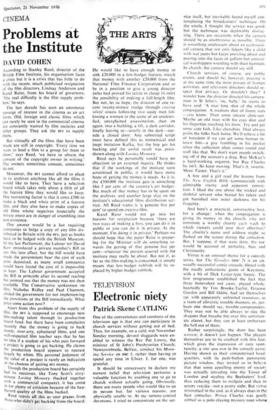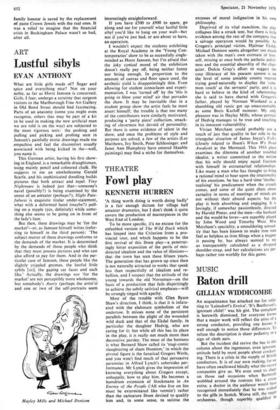TELEVISION
Electronic niety Patrick Skene CATLING One of the conveniences and comforts of the television age is that one can participate in church services without getting out of bed. Thus, for example, on a cold, wet November Sunday morning, devout sluggards were en- abled to witness the Rev Pat Lowry, the minister of St John's Presbyterian Church, Newtownbreda, Belfast, conduct his Morn- ing Service on BBC 1, rather than having to spend any time in Ulster. I, for one, was grateful.
It should be unnecessary to declare my earnest belief that television performs a valuable function by enabling one to go to church without actually going. Obviously, there are many people who would like to go in nelson but, for various reasons, are physically unable to. At my remote-control devotions. I tried to concentrate on the ser- vice itself, but inevitably found myself con- templating the broadcasters' technique. On the whole. I thought the service was good, but the technique was deplorably distrac- ting. There are occasions when the camera should be as unobtrusive as possible. 1 here is something unpleasant about an ecclesiasti- cal camera that not only fidgets like a child with wet pants but keeps prowling about and peering into the faces of gallant but unmusi- cal worshippers wrestling with their hymnals. In church, the camera should say still.
Church services, of course, are public events, and should be: however, praying is at the same time the most private of human activities. and television directors should re- spect that privacy. Or shouldn't they? I wonder how the director directed his camera- man in St John's. 'OK, baby.' he seems to have said. 'A nice long shot of the whole congregation. A medium shot of funny nats —you know. Then some sincere close-ups. Maybe an old man with his eyes shut and his fingertips touching his brow. Try and get some cute kids. Like cherubim. That always grabs the folks back home. We'll relieve a lot of boredom if we can get some human in- terest bits—a guy fumbling in his pocket when the collection plate comes round and stuff like that. We don't want people switch- ing off if the sermon's a drag. Roy McKay's a hard-working organist, but Ray Charles he isn't. So keep moving. That's it, sweetie. More. Faster. That's it.'
A boy and a girl read the lessons from The New English Bible (commercial) with admirable clarity and apparent convic- tion. I liked the one about the wicked and slothful servant who buried his talent and got banished into outer darkness for his frugality.
And here's a practical, constructive hint. for a change: when the congregation is giving its money to the church, v by not nominate a worthy charity each seek to which viewers could post their offerings? The charity's name and address might he flashed on the screen during the collection. But, I suppose, if that were done. the nac would be accused of partiality, bias and Christianity.
Virtue is an unusual theme for a comedy series, but The Goodies (Bac 2) is an un- usually successful comic crusade, filmed with the madly enthusiastic gusto of Keystone. with a bit of Dick Lester-type frenzy. The first programme established the fact that three benevolent nut cases, played whole- heartedly by Tim Brooke-Taylor, Graeme Garden and Bill Oddie. had set themselves up, with apparently unlimited resources, as a team of altruistic trouble-shooters, or, per- haps one should say. trouble-compounders. They may not be able always to slay the dragons that breathe fire over this unfortun- ate planet, but they can at least embarrass the hell out of them.
Rather surprisingly, the show has been
written; it doesn't just happen. The players themselves are to be credited with this feat.
which gives the impression of zany spon-
taneity, a sine qua non in the comedy game. Having shown us their computerised head-
quarters, with its push-button panoramic
picture window, they invited us to believe that that some appalling enemy of society-
was actually intruding into the Tower of London and stealing the Beefeaters' beef, thus reducing them to midgets and then to empty regalia—not a pretty sight. But virtue triumphed in the end. as it always does in the best comedies. Prince Charles was gently ribbed as a polo-playing mystery man whose
family honour is saved by the replacement of paste Crown Jewels with the real ones. It was a relief to imagine that the financial crisis in Buckingham Palace wasn't so bad, after all.















































 Previous page
Previous page